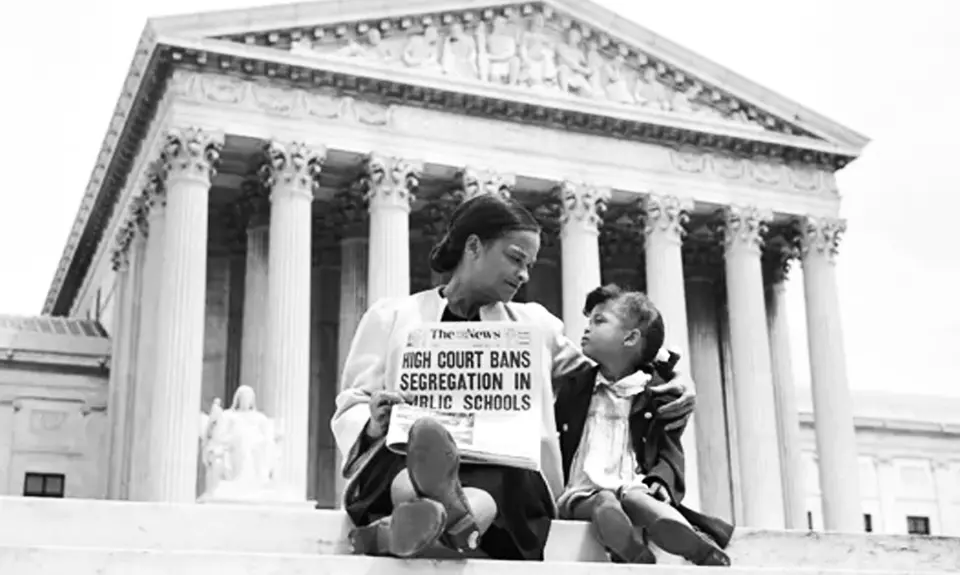As we approach the 70th anniversary of Brown v Board of Education on May 17, it is clear that this landmark decision has meant much more to our society than ending state-mandated school segregation. Brown has helped promote values and principles like the importance of racial diversity, non-discrimination, integration, and racial justice.
As reflected by recent stories concerning resegregation of schools and renaming schools after Confederate officials, our society must continue working to achieve the positive goals of Brown. Decisions by federal judges nominated by President Biden have recently played an important part in implementing them, despite dissents by Trump judges and others. For example:
-
- Last year, Biden Fourth Circuit nominee Toby Heytens cast the deciding vote to uphold a student admissions policy promoting diversity at Thomas Jefferson high school, a nationally recognized magnet school in Virginia. The school’s Board had expressed concern that incoming classes came from a “limited group” of feeder schools, and included few low-income, English-language learner, special education, or “Black, Hispanic or multi-racial” students. The Board adopted a new policy to try to increase diversity, which it had long considered an important educational goal. Even though the policy made clear that it would use only “race-neutral” methods, a group claiming to represent Asian-American students (whose numbers declined slightly under the new policy) challenged it and prevailed in a lower court.
In a 2-1 decision made possible by Judge Heytens, in which Trump judge Allison Rushing dissented, the Fourth Circuit reversed the lower court and upheld the policy. The court explained that the policy did not have an improper discriminatory effect or intent, but instead properly promoted the permissible goal of student body diversity. The Supreme Court declined to review the case, so the decision stands as an important precedent.
- Judge Dana Douglas, nominated by President Biden to the Fifth Circuit, wrote a decision of “first impression” earlier this year that partly reversed a Trump judge and ruled that a black property owner could sue the USPS because several postal workers refused to deliver mail to her property. Lebene Konan owns and rents two properties near Dallas Texas. She contends that for several years, two postal workers intentionally refused delivery because they did not “like the idea that a black person” owned the properties.
Because many civil rights laws do not apply to actions by federal officials, Konan sued under the Federal Tort Claims Act (FTCA), which allows recovery of damages from the federal government under some circumstances. The lower court judge dismissed the case. But Douglas wrote an opinion establishing that under the FTCA, the USPS can be sued for damages for workers’ intentional refusal to deliver mail. Douglas sent the case back to the lower court so Konan’s lawsuit can proceed.
- Biden Third Circuit nominee Judge Ariana Freeman wrote a 2-1 decision last year reversing a lower court and allowing a Black woman to go forward with her claim that she was illegally retaliated against for filing a state job discrimination complaint. Flavia Stovall worked for the state of New Jersey for ten years, during which she filed a state complaint concerning job discrimination. She then filed a federal suit contending, among other things, that she was illegally retaliated against for filing the state case. The federal complaint stated that just one day before her employer filed a motion to dismiss the state complaint, a supervisor directed a search of her files, in violation of workplace policy, and she was suspended without pay a few weeks later.
The lower court judge, however, dismissed the complaint before Stovall could even proceed with discovery, and she appealed. Judge Freeman wrote a 2-1 decision that reversed the district court and ruled that Ms. Stovall can go forward with her case. This was despite a dissent by a Trump judge who would have upheld the dismissal.
As these cases demonstrate, values taught to America by Brown, like diversity, non-discrimination, and racial justice, remain under contest today. These decisions also illustrate that Biden-nominated judges have played an important role in implementing these values, even as highly conservative judges nominated by Trump and others oppose these efforts. As we commemorate Brown’s 70th anniversary, the importance of Biden nominating and the Senate continuing to confirm additional fair-minded judges is more important than ever.
